Thank you for subscribing!
monthly, scholarship owl conducts research to help provide deeper insight into how Gen Z views college, financial aid, and the future. In October, we asked students for their overall opinion on the value of earning a bachelor’s degree. Numerous media reports document declines in university enrollment. However, the overwhelming majority of students responding to our survey still feel that college is worthwhile, with 93% feeling that they have a very good or very good chance of earning a bachelor’s degree. is the answer.
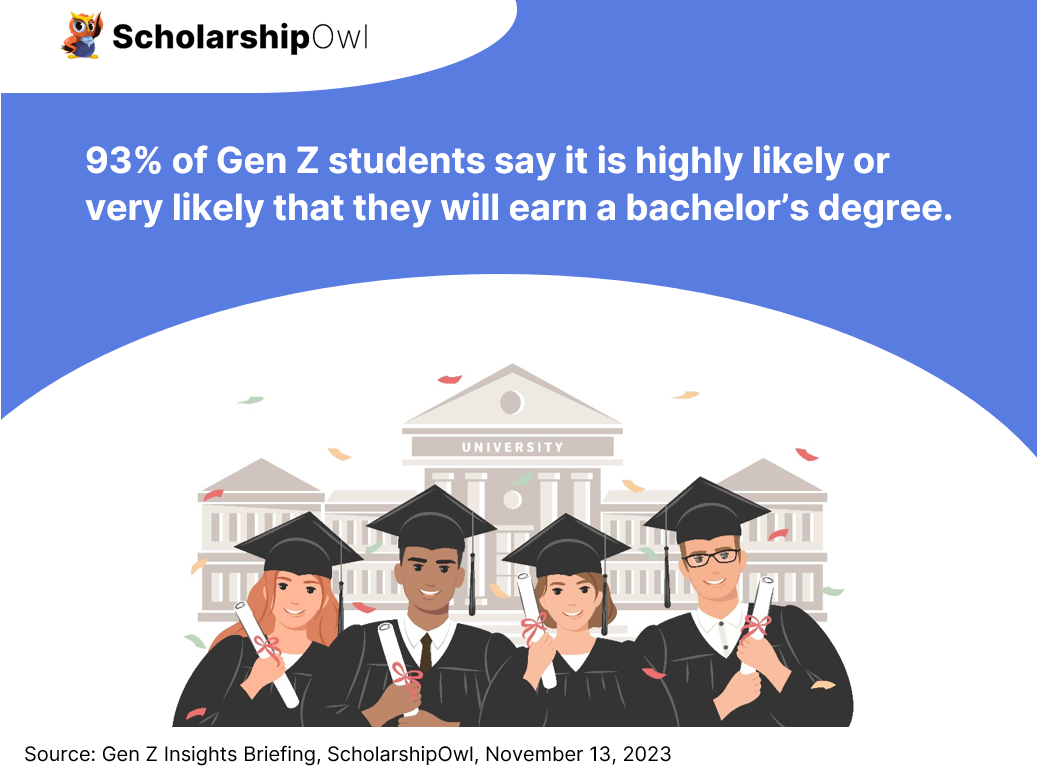
Who participated in the survey?
In October 2023, ScholarshipOwl surveyed high school and college students on the ScholarshipOwl scholarship platform to learn more about their opinions about the value of college. A total of 3,144 students responded.
Of the respondents, 63% were female, 36% were male, and 1% identified themselves as other. Nearly half (49%) identified as white, 20% as black, 17% as Hispanic/Latino, 7% as Asian/Pacific Islander, and 7% as other.
More than half of the respondents (54%) were high school students, and the majority were high school seniors. More than a third (39%) were college undergraduates, primarily first and second year college students. 5% were graduate students and 2% identified themselves as adult/nontraditional students.
survey questions
We began our survey by informing students that, based on recent trends, Gen Z students are less likely to earn a bachelor’s degree than Millennials; How much is it?” I asked. An overwhelming majority (93%) said they were very likely (78%) or very likely (15%) to earn a bachelor’s degree, dismissing these possibilities. Only 6% said they had a fair chance of earning a bachelor’s degree, and only 1% said they were unlikely to earn a degree.
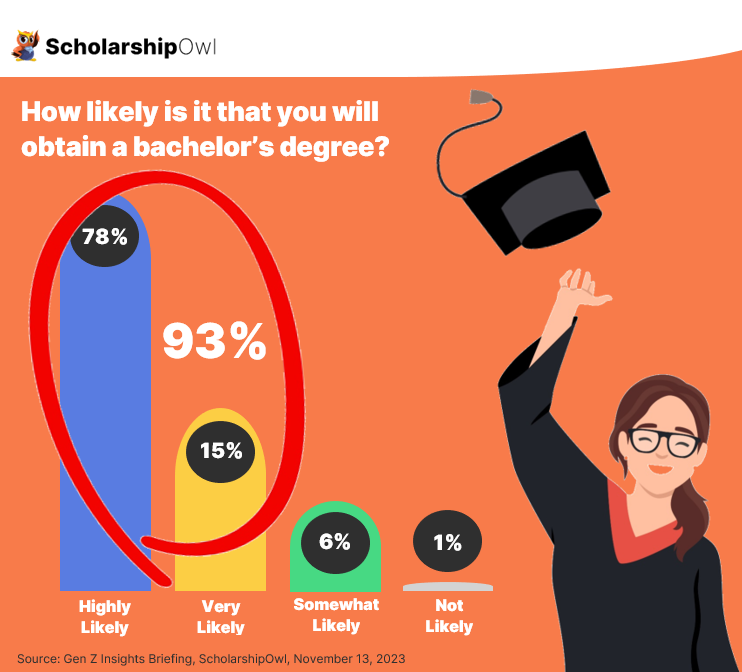
We then asked, “Which of the following most closely matches your career goals?” Almost half (48%) of students chose careers related to science, technology, engineering, and mathematics (STEM), and 28% chose biosciences/biomedical/health professions/clinical sciences. 9% chose engineering/architecture/environmental design; 8% chose Computer Science/Software Development/Web and App Development/Data Science. 2% chose Earth Science/Astronomy/Environmental Science. 1% Select Mathematics/Statistics. Less than 0.5% chose robotics/precision production/manufacturing. Almost a fifth (18%) chose a career related to business and communications, 16% chose business/management/marketing/entrepreneurship and 2% chose communications/journalism/public relations. Careers in social sciences/cultural studies were moderately popular (16%), with 8% choosing psychology/sociology/gender studies/ethnic studies. 6% chose political science/public administration/criminal justice/government/law/fire science. 1% chose History/Culture/Archaeology/World Languages; and 1% chose Philosophy/Religious Studies/Theology. Another area that attracts Gen Z students is the creative arts, with 7% choosing visual arts, design, film, animation, and performing arts. 5% of respondents chose a career in education/education and 4% of students chose a career in kinesiology/human performance. Career fields with little interest included English/Literature/Library Science (1%); Liberal Arts (1%); Culinary Arts/Hospitality (<1%); and Construction/Apprenticeships (<1%).
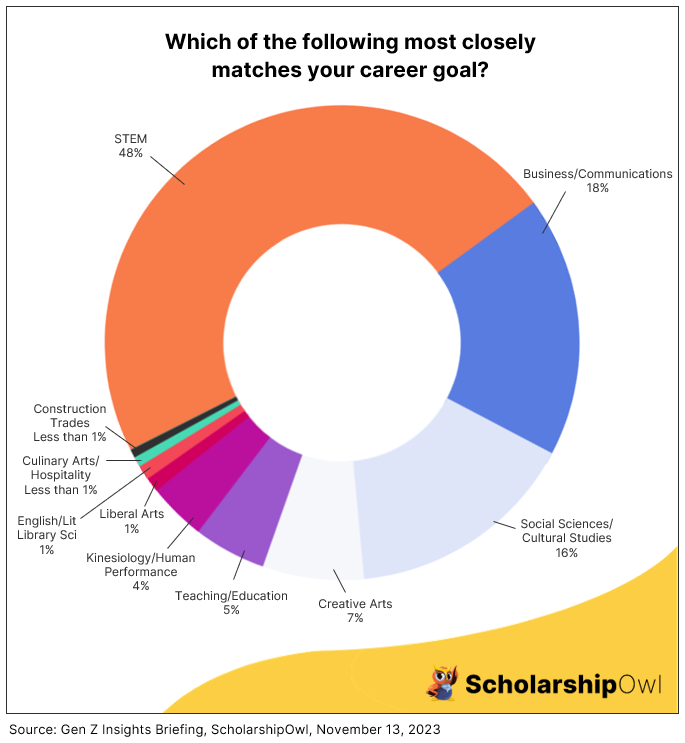
The following questions connected the value of a bachelor’s degree to students’ career interests. We asked, “Do you think the time and expense of earning a bachelor’s degree is worth it for the career path you’re pursuing?” An overwhelming majority (93%) declared that the time and expense of earning a bachelor’s degree was worth it for their career field. However, as expected, there were some differences depending on the career pursued. The overwhelming majority (94%) of students interested in STEM-related careers said that earning a bachelor’s degree would be valuable to the field. The same was true for students interested in a career in social sciences/cultural studies (94%) and students pursuing a career in kinesiology/human performance (94%). Similar numbers were true for students interested in careers in business/communications (92%), liberal arts (91%), and education/teaching (90%). Three-quarters (86%) of students interested in a career in the creative arts feel a degree in the field is worthwhile, even those pursuing a career in construction. Two-thirds (68%) feel that earning a degree is worthwhile. Worthwhile.
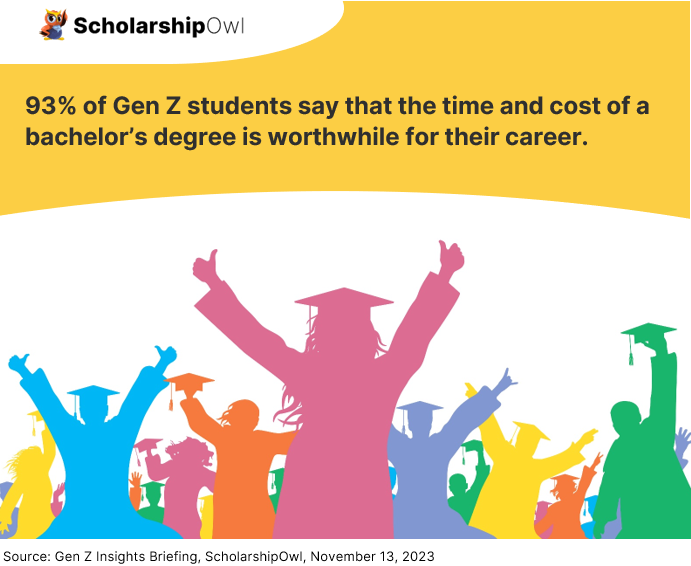
The final question asked, “Do you think you can be successful in your career even if you don’t get a bachelor’s degree?” Here, the answers were split, with half (50%) saying they would not succeed and half (50%) saying they would not succeed. As expected, these responses were also related to the students’ chosen career field. More than half (55%) of students pursuing a STEM career say they would not be successful without a bachelor’s degree. Almost two-thirds (63% and 60%, respectively) of students pursuing a career in education or a career in social science/cultural studies believe they will not be successful without a bachelor’s degree. I feel it. Just under half of students interested in a career in Kinesiology/Human Performance (49%), English/Literature (45%), or Liberal Arts (44%) say they would be successful without a four-year degree I did. Professions where students felt confident in their ability to succeed without a degree were business/communications, creative arts, culinary/hospitality, and construction. Just over a third (36%) of business/communications students and less than a third (29%) of creative arts students felt they could succeed without a bachelor’s degree. Additionally, only 23% of students interested in culinary arts and hospitality and 16% of students interested in construction felt they needed a bachelor’s degree to be successful.
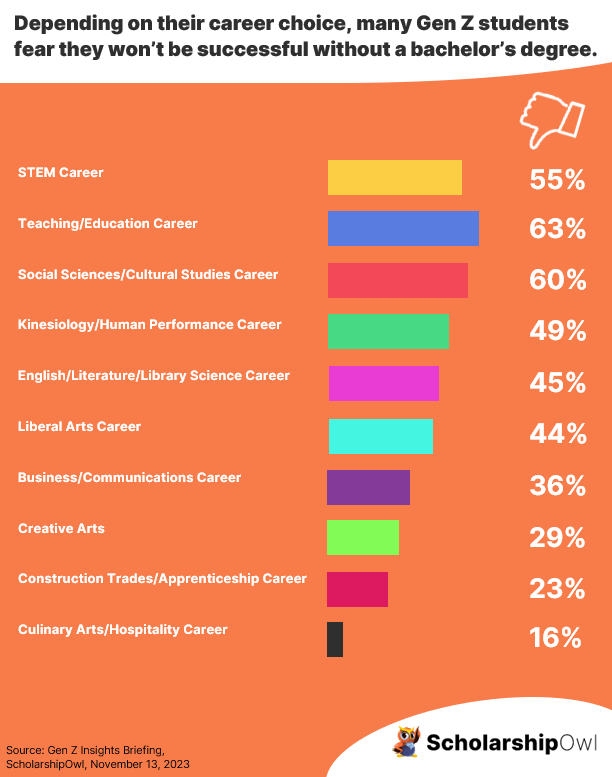
Important points
Despite media articles suggesting that Gen Z students are less interested in earning a bachelor’s degree, our research shows that the majority of students still dream of attending college, and most do not pursue that path. I understand that you are pursuing it. The results also indicate that students are carefully tailoring their academic paths toward the specific career they are pursuing. For example, students who are primarily interested in pursuing careers that require higher education, such as STEM or engineering careers, indicate that they are more likely to earn a bachelor’s degree.
On the other hand, students pursuing creative careers, business/communications careers, or construction industry careers understand that a bachelor’s degree may not be as necessary to be successful in their chosen endeavor. Masu. This also means that students value ensuring that their investment in higher education is worthwhile, meaning that the cost of obtaining higher education leads to a financially advantageous and emotionally fulfilling career. It also shows that you want something.
Is it possible to get a college education without taking out student loans?
yes! You don’t have to suffer from student loans. Students can instead use debt-free resources to pay for college.
- To access federal and state grant aid, FAFSA.
- Prioritize scholarship applications scholarship owl.
- Work part-time during the school year and full-time during breaks. Use the money you earn to pay for your college education.
- Choose a more affordable option for attending college, such as starting at a community college.
Apply for scholarships and jobs, not loans. That way, you can graduate debt-free and start your new career with confidence.